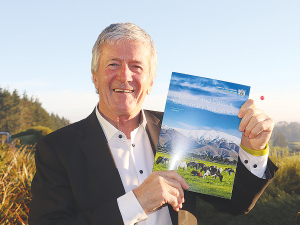NZ food & fibre exports to reach record $62b by 2026
New Zealand's primary sector is set to reach a record $62 billion in food and fibre exports next year.
 Agriculture Minister Damien O’Connor with the Ministry for Primary Industries’ latest Situation and Outlook for Primary Industries (SOPI) report at National Fieldays this month.
Agriculture Minister Damien O’Connor with the Ministry for Primary Industries’ latest Situation and Outlook for Primary Industries (SOPI) report at National Fieldays this month.
For the much-maligned dairy industry, NZ's primary export returns for 2023 would be looking grim.
That's the conclusion one can draw from the Ministry for Primary Industries' latest Situation and Outlook for Primary Industries (SOPI) report, released before a group of industry leaders at the Fieldays. The report shows that earnings from the dairy sector were $25.1 billion - double that of the meat and wool sector and more than three times that of horticulture.
The total revenue from the primary sector for 2023 was a record $56.2 billion - nearly $3 billion more than last year. The very good news is that dairy exports are predicted to reach $28.2 billion by 2027, while export growth for meat and wool will remain static for the next four years and is unlikely to reach the $12.3 billion it was in 2022.
The section in the SOPI report on dairying notes that China is easily NZ's single biggest market for dairy products, taking 34% of our exports. Indonesia at 6% is the next biggest market with Australia third at just 5%. China is the biggest market for all our dairy products except casein and products which is snared by the US.
According to the SOPI report, the performance by the dairy sector is excellent, especially considering the challenges and uncertainties it has faced due to Covid-19 in China. But there are also warning signs in the report with commentary on the fact that global dairy prices are in decline, although they remain above average. It notes that demand for dairy has weakened due to a slowdown in global economic growth, rising inflation and high food prices.
It also points to better supply coming onto the world market from the EU and the US in the past season, but goes on to suggest that milk production in these countries has now slowed and will likely prevent any crash in dairy prices.
There is recognition in the SOPI report of high farm input costs affecting on-farm profitability in NZ, but it says that the staff shortages in the sector are easing and, as most of us have seen, pasture grown in the past few months has been excellent.
Overall, the SOPI report paints a picture of a good 2023 year, but that growth in the coming few years will be incremental rather than spectacular. Horticulture will go through something of a rebuilding phase to get volumes of kiwifruit and apples up, while meat and wool remains a challenge.
Controls on the movement of fruit and vegetables in the Auckland suburb of Mt Roskill have been lifted.
Fonterra farmer shareholders and unit holders are in line for another payment in April.
Farmers are being encouraged to take a closer look at the refrigerants running inside their on-farm systems, as international and domestic pressure continues to build on high global warming potential (GWP) 400-series refrigerants.
As expected, Fonterra has lifted its 2025-26 forecast farmgate milk price mid-point to $9.50/kgMS.
Bovonic says a return on investment study has found its automated mastitis detection technology, QuadSense, is delivering financial, labour, and animal-health benefits on New Zealand dairy farms worth an estimated $29,547 per season.
Pāmu has welcomed ten new apprentices into its 2026 intake, marking the second year of a scheme designed to equip the next generation of farmers with the skills, knowledge, and experience needed for a thriving career in agriculture.
OPINION: Staying with politics, with less than nine months to go before the general elections, there’s confusion in the Labour…
OPINION: Winston Peters' tirade against the free trade deal stitched with India may not be all political posturing by the…